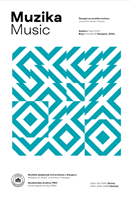Glazbena improvizacija na pisani tekst: Koliko značenja glazba može prenijeti slušateljima i koje vrste?
Musical improvisation on written text: How much meaning can music convey to listeners and what kinds?
Author(s): Helena DukićSubject(s): Music, Lexis, Sociology of Art, History of Art
Published by: Univerzitet u Sarajevu - Muzička akademija; Muzikološko društvo FBiH
Keywords: lexical meaning of music; emotions; musical movement; improvisation;
Summary/Abstract: This study aimed to explore how well musical improvisers convey meaning from short texts to listeners. Four pianists read nine haiku poems, with themes ranging from animal movements and human emotions to natural environments. Each pianist improvised on every haiku, aiming to express its essence through music. Thirty-six recordings of these improvisations were played randomly to seventeen school children, who then tried to discern the music’s message and describe the feelings and movements depicted. Results showed that listeners accurately perceived the pianists’ intentions for happiness, anger, surprise, fear, and disgust, but not for sadness. They also successfully interpreted attempts at expressing slow, fast, irregular, up, down, and rough movements, but struggled with regular, big, small, and smooth ones. Overall, listeners often couldn’t identify the haiku’s theme. This suggests that while music lacks specific lexical content, it effectively communicates clear basic emotions and movements crucial for immediate survival.
Journal: Časopis za muzičku kulturu Muzika
- Issue Year: XXVIII/2024
- Issue No: 1
- Page Range: 7-31
- Page Count: 25
- Language: Croatian

